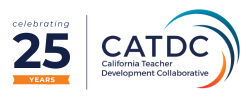Back to School: Creating Safe, Equitable Spaces for All

Anyone who has been following the news this past summer has noticed much tumult in the world and in our nation. The marches and counter-protests in Charlottesville and Boston ring alarm bells for anyone who believes in a socially just world. It’s a chilling time to be a member of this nation, and as educators, we have an even more noble cause to take up: the act of making our classroom and school spaces safe, equitable, and inclusive for all our students—especially as we begin this school year.
This summer I had the honor of co-facilitating Teaching Foundations in Los Angeles and San Francisco, and in that program, we do work with teachers around identity and cultural responsiveness with the ultimate aim of knowing who our students are so we can best provide them access to success in our classrooms. We invited participants to consider ways they can co-create classroom spaces that allow students to have multiple ways into our curricula. It was powerful to hear our participants share their own cultural stories, and in turn, consider ways they can help their students to feel safe, loved, challenged.
On top of the myriad responsibilities of being a teacher, it can feel daunting to determine ways to be culturally responsive and ensure we know how students’ identities and backgrounds impact who they are in our classroom spaces. And yet, we can’t teach well without this crucial approach—to know our students as human beings so we can provide them pathways for making the world better for all.
And even more importantly, we educators are not alone in these turbulent times. We’re part of a greater community of those who have chosen this profession, to engage in the act of raising human beings together. When asking the question, “What can I do to create equity in my school community?” consider the following resources to get you started:
- NPR: Resources for Educators to Use in the Wake of Charlottesville
- Teaching Tolerance: a treasure trove of resources sponsored by the Southern Poverty Law Center
- Making Connections: Culturally Responsive Teaching and the Brain – an interview between Elena Aguilar and Zaretta Hammond, author of the book, Culturally Responsive Teaching and the Brain.
Here’s to the start of another school year. May your schools and classroom spaces be safe and inclusive for all, and may you have the resources you need to promote equity for all.
Photo Attribution by PhotosForClass.com
Lori Cohen: Lori Cohen is the Dean of Faculty at the Bay School of San Francisco. Prior to her current position, Lori taught Humanities, Literature, and Religion/Philosophy at Bay for many years. Lori also coordinates Teacher Development seminars, in-house professional development, for Bay faculty and has begun a Teaching Fellows program that will be entering its third year. This will be Lori’s fourth year as a co-facilitator/teacher leader in Teaching Foundations, a program that brings her joy and professional rejuvenation.
